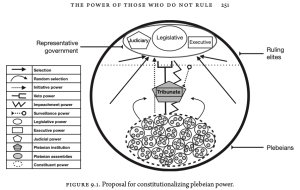Difference between revisions of "Collective law-making process"
Jump to navigation
Jump to search
m |
|||
| Line 1: | Line 1: | ||
== | == Methodologies for participatory law-making == | ||
=== Citizen panel, in presence === | === Citizen panel, in presence === | ||
| Line 41: | Line 41: | ||
* the metabolic cell transmits the voted proposal to a parliamentary group | * the metabolic cell transmits the voted proposal to a parliamentary group | ||
=== | === houseofcommons.ch === | ||
* Law as an evolving commons of glocal customs – collectively defining the rules that affect us | |||
* Very large scale | |||
== Comparison == | |||
* legal paradigms | * legal paradigms | ||
* benefit of random selection → get people that would usually not contribute | * benefit of random selection → get people that would usually not contribute | ||
== Research groups == | |||
* [https://www.citizencyberlab.org/ Citizen Cyber Lag] (Geneva) | |||
* [https://www.dsi.uzh.ch/en.html Digital Society Initiative] (Zürich) | |||
* [https://www.ta-swiss.ch/ TA Swiss] | |||
* [https://www.zdaarau.ch/en/ Zentrum für Demokratie] (Aarau) | |||
== Software == | |||
=== Learn === | |||
* [https://prototypefund.opendata.ch/project/baloti/ Balotti] | |||
* [https://www.nedao.ch/ nedao.ch] (Neuchâtel) | |||
=== Agree, prioritize === | |||
* [https://citizentalk.ch/ citizentalk.ch] | |||
* [https://decidim.org/ decidim.org] | |||
* [https://democraciaos.org/ democracyos.org] | |||
* [https://e-mitwirkung.ch/ e-mitwirkung.ch] | |||
* [https://www.engage.ch/ engage.ch] | |||
* [https://consulproject.org/ consulproject.org] | |||
* [https://nextzuerich.ch/ nextzuerich.ch] | |||
* [http://petitio.ch/ petitio.ch] | |||
* [https://policykitchen.com/ policykitchen.com] | |||
* [http://swarmops.com/ swarmops.com] | |||
* [https://www.reddit.com/ reddit.com] | |||
* [https://team-freiheit.ch/ team-freiheit.ch] | |||
* [https://www.wunsch-schloss.ch/de/ wunsch-schloss.ch] | |||
=== Compare, merge === | |||
* [https://about.gitlab.com/ gitlab.com] | |||
* [https://joinup.ec.europa.eu/ joinup.ec.europa.eu] | |||
* [https://opentechresponse.com/ opentechresponse.com] | |||
* [https://www.ossdirectory.com/ ossdirectory.com] | |||
=== Pool resources === | |||
* [https://cobudget.co/ cobudget.co] | |||
* [https://jogl.io/ jogl.io] | |||
* [https://joinseeds.earth/ joinseeds.com] | |||
* [https://mikorizal.org/ mikorizal.org] | |||
* [https://opencollective.com/ opencollective.com] | |||
== Dissemination == | == Dissemination == | ||
Revision as of 16:15, 27 March 2022
Methodologies for participatory law-making
Citizen panel, in presence
- Oregon
- Massaschussets
- Eupen (Belgium)
- Sion/Sitten
- Methodology
- 20-50 citizens randomly selected with municipality from an official electors list
- 2000 letters of invitation sent, 200 positive answers, random selection of 20 participants using a software to ensure representativity (age, political view, sex, income level) + 20 reserve (180 left)
- 2 x 2 days
- 500.– fees reimbursed
- Support: facilitators, technique (microphones, ...), copies (proposals documentation, ...) legal experts (terminologies, ...), catering, ...
Liquid democracy, online
- selection of 2000 citizens
- give access to a platform where they can make proposals and vote
- list of important topics selected by a public authority
- then a citizen panel is organized for each topic
Plebean republic
Plebeian institutions allowing for the direct participation of all adult residents in deliberation and public judgment are foundational to free government; equal liberty for all residents cannot be guaranteed without them.
- The Plebeian Branch is to be composed of two basic institutions:
- A decentralized network of local assemblies of residents (see section II).
- A Tribunate—an office aimed at enforcing motions approved by the network of assemblies, and at fighting political corruption.
- The total aggregation of local assemblies is the sovereign subject of the republic; a decision reached in the majority of assemblies is the legitimate will of the people, and all branches of government must yield to it and properly enforce it.
- The Plebeian Branch is to be funded by a national tax collected for the sole and direct purpose of funding all the costs associated with the operations of local assemblies and Tribunate offices, and their appropriate exercise of constitutional powers.
- All branches of government—Executive, Legislative, and Judicial— are to obey decisions reached by the Plebeian Branch.
Legislative theater
Participatory theater for people to create laws[1] → video
- the joker asks: if you had the ability to create a law, what would it be?
- a scene of oppression is played (theater-forum)
- the audience writes down proposals which are passed on to a metabolic cell composed of an activist, a parliamentarian and a lawyer specialised in the theme
- the metabolic cell synthesises the notes and describes the laws that already exist, and makes 3-4 proposals for amendments or new laws
- at the end of the stage, the metabolic cell presents its results to the audience
- the audience debates the results and votes
- the metabolic cell transmits the voted proposal to a parliamentary group
houseofcommons.ch
- Law as an evolving commons of glocal customs – collectively defining the rules that affect us
- Very large scale
Comparison
- legal paradigms
- benefit of random selection → get people that would usually not contribute
Research groups
- Citizen Cyber Lag (Geneva)
- Digital Society Initiative (Zürich)
- TA Swiss
- Zentrum für Demokratie (Aarau)
Software
Learn
Agree, prioritize
- citizentalk.ch
- decidim.org
- democracyos.org
- e-mitwirkung.ch
- engage.ch
- consulproject.org
- nextzuerich.ch
- petitio.ch
- policykitchen.com
- swarmops.com
- reddit.com
- team-freiheit.ch
- wunsch-schloss.ch
Compare, merge
Pool resources
Dissemination
- ↑ Boal A. Legislative Theatre. Using performance to make politics. Routledge 1999. https://www.routledge.com/Legislative-Theatre-Using-Performance-to-Make-Politics/Boal/p/book/9780415182416
